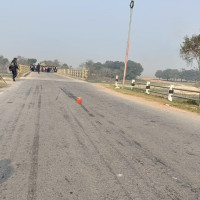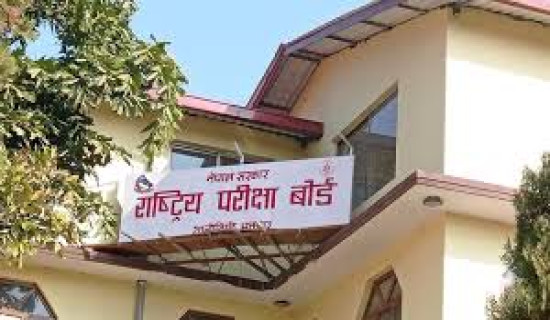- Wednesday, 18 February 2026
Biofertiliser (Jholmal)
A Solution For Soil, Human Health
She continues to chop the leaves of the harvested veggies in her field while carrying practically a bucket's worth of cauliflower on her back. There are no pesticides used in the cultivation of this cauliflower. Before pesticides were employed, the area used to smell fairly awful, but not longer, according to Shavitri Neupane. While these cauliflowers are somewhat smaller than they were when I was using chemical fertiliser and insecticide, I am confident that they are still nice and healthy.
On an area of land covering around two ropani, Neupane, 45, of CharangePhedi, Namobuddha Municipality-6, Kavre, has been growing vegetables for seven years (1017 square meters). She has been growing without using chemical pesticides and fertilisers for the last three years. Production and profit are not much different from one another.
Organic Farming
Sabitri remarked, grinning, "I have produced these cauliflowers using organic pesticides and jholmal (liquid manure) created from locally accessible plants, including mugwort, neem, and chinaberry leaves." She was switching from field to field to gather cauliflower that was ready to be sold. "I don't see a difference between utilising chemical pesticides and the existing revenue, even if the size is little." "That makes me happy," you say.
In the past few years, many farmers in Charange Phedi, including Shavitri, have started using organic manure.
Farmers are receiving the technical and skill-based support they need to transition from chemical fertiliser and pesticide-based farming systems to organic farming based on locally accessible resources from the municipality's Agricultural Service Office, scientists and researchers from Kathmandu University, and ICIMOD. Shavitri and other local farmers produce liquid fertilisers and natural insecticides in groups for usage amongst one another.
Bharat Neupane stated, "For the past five years, I have been engaged in commercial farming using bio-fertilizers and organic pesticides. "We established the Farmers Group named Radhakrishna and began producing bio-fertilizers and insecticides jointly after receiving the required training and fundamental supplies." Also, it is less expensive than chemical insecticides and fertilisers.
The most significant farmer in CharangePhedi and the nearby villages is Neupane, 60.
He made farming his life's work. He said, "I started commercial vegetable cultivation 12 years ago." "It was entirely relied on chemical fertilisers and insecticides for the first seven years." While my income was high at the time, I was not at peace with myself since I knew that chemical pesticides were like gradual poison to the health of clients. But now, in addition to the money, I also feel accountable. It appears that I am producing secure food.
According to Shavitri Neupane, who switched from using chemical fertilisers and pesticides to organic farming with the help of her neighbour and influential farmer Bharat Neupane, one ropani (508 square metres) of land requires 50 litres of biofertiliser and 30 litres of organic pesticides. Around 80–85 of the 120 families in CharangePhedi are involved in small-scale to commercial farming.
There are 50 members of the Radhakrishna Farmers Group, which was founded to support organic farming. "Among them, 10 to 11 households practise biofertiliser-based commercial farming." Bharat Neupane remarked, "We prepare Jhol mal and bio-pesticide as a group; it takes 30 days.
When chemical fertilisers and pesticides are applied, Bharat has learned that the output is higher in the first few years and that the dosage of pesticides must be progressively raised. "Now that we are using Jholmal, I feel the soil quality has improved, even if the yield is little lower, the duration is slightly longer, and the veggies seem less glossy than they did when we were using chemical fertiliser," the grower said. We used to sell veggies for NRs 900,000 annually, and our profit was NRs 500,000, he claimed. There hasn't been much change even after predominantly Jholmal farming.
Collaboration
The advantages of growing crops with the help of biofertilisers and organic pesticides have been explained by experts who have been giving farmers in villages like CharangePhedi the technical assistance and essential science-based information.
The farmers of Charange Phedi have been working with academics from Kathmandu University based in Kavre and the International Integrated Mountain Development Center (ICIMOD), which is assisting in producing significant knowledge in the fields of environment and people's livelihoods in the Hindu Kush Himalaya region and disseminating it to the general public.
Farmers have traditionally used bio-fertilizer and organic insecticides on their own, according to Kiran Bhusal, Lecturer of Agricultural Entomology at the Department of Life Science at Kathmandu University; "we are merely offering technical help to match the soil requirements and dosages." According to researcher Bhusal, "Jholmal is a historically applied, handmade liquid biofertiliser and insecticide manufactured by combining animal urine, farmyard manure (FYM), locally accessible botanical plants with insect repelling qualities, and water at certain ratios."
Alternative To Pesticides
As an alternative to chemical pesticides, jholmal-based farming has been practised in Kavre for more than five years. In the long run, it is a very efficient way to keep soil fertile and manage plant pests. Farmers have been able to improve output while cutting expenditures. "Farmers have accepted these technologies based on their awareness towards environmental difficulties, health-related issues, and soil degradation caused by chemical pesticides and fertilisers," continued Bhusal, who has produced research articles in partnership with other researchers.
There is a connection between biofertiliser (Jholmal) and crop and soil quality, according to action research carried out in Bhutan and Nepal.
According to researcher Erica Udas, "When we compared the usage of jholmal with business as usual practises that farmers use to apply chemical fertilisers in Kavre district, Nepal, as well as in Bhutan, we noticed a difference in crop yields." Improved biofertiliser can increase soil fertility and yield, according to peer-reviewed research papers, but "we are still working on it and would like to mention here that to observe significant changes in soil quality it takes years and a long-term research effort will be required," the papers state. Udas said that she works for the ICIMOD as an ecosystem analyst.
Nature-based farming may be a very effective choice for farmers to deal with the condition of climate change and food insecurity, according to researchers like Udas and Bhusal. They claim it is laborious but, when done correctly, yields quite amazing results. Bhusal claims that while there isn't just one method, if a community uses it well, it may one day replace chemical-based farming, hence lowering the reliance of Nepali farmers on imported fertilisers and pesticides.
Impossibe
Particularly those who cultivate crops on a big scale, not all farmers in the area are drawn to chemical-free agricultural methods and pesticide-free gardening. For more than 20 years, Umesh Neupane, 26, and his family have grown veggies for market. Umesh is now in charge of continuing the family heritage of vegetable growing, which his father began 22 years ago when he founded a commercial farm.
Nonetheless, they continue to use chemical pesticides and fertilisers. Umesh gave the reason why they aren't transitioning to organic farming: "We haven't been able to cultivate without artificial fertilisers and pesticides since there are more illnesses and insects."
Also, organic farming has a very low yield and requires an additional 15 to 30 days for crops to mature, so we must be able to produce on schedule in order to compete with market prices.
Bharat Neupane, a prominent farmer, concurs with Umesh's assertion. The size is a little bit small, and it takes more time, it is observed. In the long run, he claimed, "I have found that Jhol fertilisers and organic insecticides are beneficial."
Bharat, however, asserted that he is not yet fully capable of engaging in organic farming. Chemical pesticides must be used in epidemic situations, according to this statement. If there had been another option, he said, agricultural production might have begun in a completely safe manner as well.
It is an issue of how to explain the beneficial impacts and long-term advantages of biofertiliser and its favourable effects on the soil, according to a researcher. Because they are not aware of the long-term financial benefits that may be acquired through nature-based farming, "few farmers are prepared to change their agricultural practises away from chemical-based farming." While they are only aware of the knockdown effect of chemicals and their quick response, according to researcher Bhusal, "They are unaware of the health risks like high blood pressure, cough, fever, cold, joint pain, gastric headache, diabetes, stomach pain, and eye problems that can be caused by the chemicals." Like Shavitri, the farmers of Charange Phedi expressed their belief that using pesticides causes illness. "It makes us feel sick and burns when we apply chemical insecticides."
Focusing on small-scale or home farmers is what researcher Udas advises. Cow urine is the primary component in Jholmal preparation, and the amount used affects how much Jholmal is produced. It is difficult to employ jholmal on a wider scale since, as is well known, most farmers nowadays only keep one or two cattle per home.
She said, "This is thus advised for smallholder agricultural systems for safer food production."
Assistance Required
Charange Phedi might serve as an illustration of biofertiliser or nature-based farming, however local governments and the federal government are criticised by farmers for not providing adequate assistance. We don't have any other means of income generation, and we are content with our agriculture-based economy, thus my entire family is involved in farming. Bharat stated, "We have gotten technical and knowledge help from scientists, but we haven't been able to garner much support for organic farming from the local and federal governments."
The local government does occasionally give out seeds and certain agro-machinery subsidies, but "it is not enough for organic farming," according to Bharat.
On the other side, Kunsang Lama, the mayor of Namobuddha Municipality, claims that the regional administration is making every effort to assist organic farming. The primary source of income in this area is farming. As much aid as feasible has been offered by the municipal budget.
The Namobuddha municipality has a total budget of NRs 720 million for this fiscal year, but only NRs 5 million has been set up for the agriculture and livestock industries. A separate budget is not set out for organic farming. Mayor Lama remarked, "We don't have enough money to invest since the focus is on development operations like roads and bridges.
The Ministry of Agriculture and Livestock added that because all agricultural rights have been delegated to the provinces and municipal levels, they are not interfering with programmes on that level. "We have only been sparingly supporting the budget." According to the Ministry of Agriculture and Livestock's spokesman Prakash Kumar Sanjel, "it is up to the local government how they want to spend that fiscal help."
According to the ministry, the Bagmati province has received Rs 19.98 million to support organic farming. But, according to Mayor Lama, the province has not provided any fiscal assistance for organic farming.
Notwithstanding the fact that the funding was insufficient to meet their actual needs, it is apparent that organic farming has given local farmers cause for optimism. Sabitri Neupane is happy that she can offer veggies grown organically. "I used to use chemical pesticides in the past, and even though I made money at that time, my heart was not content." "Now I feel accountable, and it brings me inner peace," she claimed. She said that "soon after spraying pesticides," she experienced "skin irritation, nausea, and breathing issues." Farmers are more prone to face both short-term health difficulties like Sabitri and chronic ailments such chronic neuropathic pain, arthritis, cardiovascular disease, and diabetes, according to a study by the Nepal Health Research Council that was published in 2016.
The earth remains unharmed. There is still a long way to go, but if I decide to grow my farming in the future, I want to use organic fertilisers. "Because I'm devoted to taking precautions for the health of people and the earth." Shavitri smiled as she spoke.
(Dhakal is a freelance journalist who writes on environment, agriculture, climate change)

















